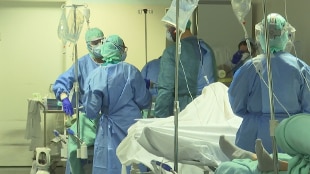- WHO: heroic Italian doctors, incredible government commitment
- Italy, still 6 doctors died from the coronavirus, in Turin legal action against the state
- Emilia Romagna, asymptomatic doctors at work
Share
March 26, 2020 The list of doctors who did not make it due to the Covid-19 epidemic is lengthening: there were 33 dead, but yesterday late in the evening, we learn from the National Federation of Medical Orders (Fnomceo), news has come of the disappearance of three other white coats, all from Bergamo.The number of infected health workers also increased: according to the latest data from the Higher Institute of Health, they rose to 6205, or more than 9% of the total cases.
Fnomceo in letter Bmj: "Immediately protections and tests"
Immediately unlock supplies of personal protective equipment and perform rapid response tests, followed by swabs, in a systematic manner to all healthcare professionals in the public and private sectors who show symptoms of Covid-19 infection, even mild and in the absence of fever or who have been in contact with suspicious or confirmed cases. These are the immediate requests of Italian doctors in a letter published in the British Medical Journal signed by President Fnomceo Filippo Anelli.
Protections and tests, says the president of the National Federation of Medical Orders (Fnomceo) Filippo Anelli, must be guaranteed to all doctors in the front line, "including general practitioners and nursing home or nursing home operators and day care centers ". Among the co-authors of the letter, the presidents of the provincial federations of Taranto, Milan and Lecce, as well as researchers from the Italian environmental medicine society Sima and the UNESCO Chair of the Federico II University of Naples.
The letter mentions the numbers of infections and deaths among Italian doctors and stresses that "it is reasonable to assume that these events would have been largely avoidable if health workers had been correctly informed and equipped with sufficient adequate personal protective equipment: masks, gloves, disposable gowns, protective visors, which instead - doctors say - continue to be in short supply or to be unacceptably sipped in the midst of an epidemic to which Italy too had declared itself ready only at the end of two months does". A greater commitment to surveillance on the territory is also requested: "No epidemic is controlled with hospitals, as it has perhaps been erroneously imagined: it is on the territory that identification of cases must be carried out with reliable tests but also with rapid screening kits and the surveillance with contact traceability, monitoring and isolation ".

